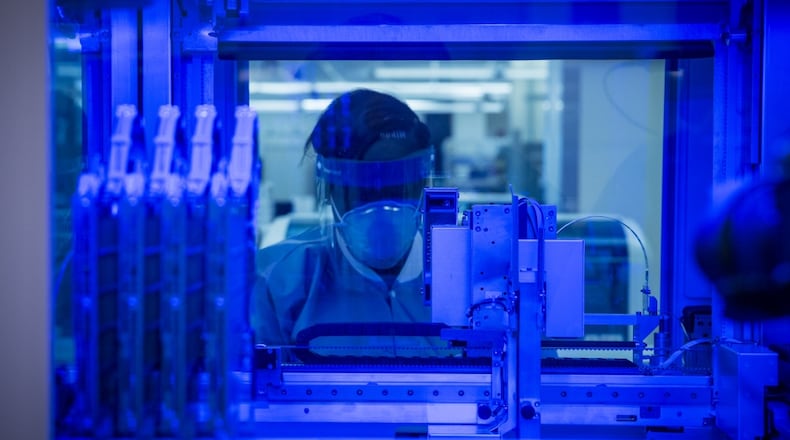Lt. Col. Aaron Lambert said the lab is running more tests for COVID-19, the illness caused by the SARS-CoV-2 virus, than any Department of Defense facility.
“Our people have always been ready for this, probably not in this capacity,” Lambert said. “I have an amazing crew here, and without them, this definitely can’t get done. I know they’re all out there, they’re all working hard. And it shows. They’re very proud of what they do.”
He added: “They’re proud that they can come in every day and make a difference.”
When it comes to combating the spread of COVID-19, knowledge is key, and that’s where the “Epi Lab” comes in.
What follows is a new Dayton Daily News interview with Lambert, edited for space.
Dayton Daily News: What is your mission?
Lambert: "Our job is to take samples from all over the DoD and run them because other labs cannot run them. That’s what ‘Epi’ is; that’s what ‘Epi’ has always been. We had the model and the construct in place from day one. I mean, we’ve been doing this many, many years. And so we have the capability. We have the personnel to take this project on. And the DoD knows that.
“We’ve always been the go-to when it comes to large testing and bulk testing, search testing. We took on H1N1 in 2009 and some of the other diseases that have come out since then. This is a lot bigger, of course, a lot more ‘eye on the public’ if you will than those (other diseases) have been. Short story: We’ve always been postured to take on more samples."
DDN: How many people did you have pre-COVID? And how many today?
Lambert: "We started testing in March. And my lab at that time was just shy of 100 personnel. Currently, I have 125 personnel working here. Now, granted, not everyone is doing direct COVID testing. But it’s a machine. One part depends on the next part, depends on the next part. And so, without one of those cogs or each of those pieces, the process wouldn’t get it done.
DDN: This has become a seven-day-a-week operation?
Lambert: "We are. It varies based on the department, but I have anywhere from two to three shifts per day.
DDN: (Air Force Research Lab Commander) Brig. Gen. Heather Pringle last week said you have tested 120,648 samples. What does a typical day look like for you, if you have a typical day?
Lambert: "If you do an average, we’re going to get between 1,000 and 1,200 (samples) a day. Some days it’s more, some days it’s less.
DDN: I’ve been told the current turnaround time is just over 19 hours.
Lambert: "That is from the time the sample arrives here at Epi Lab. Being that people are sending it from all over the U.S. and all over the world, that 19 hours is from the time we actually receive the specimen.
"We put in multiple test systems and redundancies to make sure that there are no work stoppages. We have plans and contingency plans for what happens if we run out of supplies. Or what happens if this test system goes down. Our big thing is to never be at a work stoppage, that we have multiple plans to move forward, to push through those samples.
“Moving a seven-day, 24-hour schedule has basically allowed us to go forth and resolve those samples in that short amount of time.”
DDN: Based on what you’re seeing from those samples, can you say whether some bases or parts of the DoD are suffering COVID worse that others?
Lambert: “I actually am not going to answer that based on the bases and potentially operational security on that one.”
DDN: "But the data you see helps the Department of Defense answer questions like that?
Lambert: “It does ... We see increases in testing when the nation sees increases in testing. Our numbers are directly proportional to the national numbers."
DDN: What’s ahead for you? Can you handle even further ramped-up testing?
Lambert: “My lab, we are the head of global DoD flu program. Also with COVID, we will start seeing an increase in influenza cases. And that’s one thing we’ve always done, the flu program.”
About the Author




